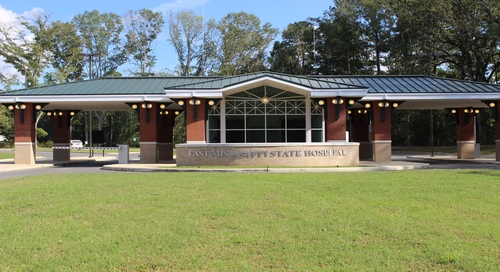East Mississippi State Hospital Chemical Dependency Unit

About East Mississippi State Hospital Chemical Dependency Unit
The vision of EMSH’s consolidated behavioral health programs (North Mississippi State Hospital, South Mississippi State Hospital, and Central Mississippi Residential Center) is to be a leader in partnering with a coordinated network of recovery-oriented community based services and supports that is person-centered and builds on the strengths and resilience of consumers, families, and communities to achieve improved health, wellness, and quality of life for those with mental disorders in the State of Mississippi.
Inpatient Services
24-hour a day, 7 days a week, short term, intensive inpatient treatment to Individuals Receiving Services(IRS) admitted from one of any mental health regions in the hospital catchment area.
Comprised of 3 phases-
1. Observation & stabilization.
2. Therapy processes & dual diagnosis.
3. Discharge planning & community awareness.
Division of Community Services
Provides a continuum of programs to educate and assist adult psychiatric IRS to function more independent in the community. This division includes the following programs:
Kemper County Group Homes:
Provides supervised living in home-like settings. Emphasis is placed on interdependency and residents enjoy the recreational and leisure activities of the community and have the support of staff to improve their daily living and psychosocial skills.
*Kemper County Group Home does not accept group home residents that are not already receiving treatment from EMSH.
| Levels of Care | Detox Service Setting | Programs | Payment Options | ||
|---|---|---|---|---|---|
|
Inpatient and residential programs provide round-the-clock medical and emotional support as you live at the treatment facility. This level of care may be recommended if you have severe addictions or mental health conditions since it removes outside distractions and allows you to focus solely on therapy. |
|||||
|
Hospital detoxification allows you to withdraw from drugs or alcohol in a hospital setting. It’s ideal for people with severe withdrawal symptoms or complex medical needs. You’ll receive constant monitoring, emergency care if needed and FDA approved prescription medications. |
|||||
|
Adult programs address the substance use and life challenges specific to adults. Therapists can deliver sessions in individual, group and family settings. Services often include job support and life skills training in a structured environment. |
Alcohol detox programs offer medical support to help individuals withdraw safely from alcohol. Your care team may use medications to ease your symptoms and provide medical monitoring to address complications. |
Drug detox programs support individuals who are withdrawing from addictive substances like cocaine and heroin. Medical support helps you manage symptoms in a controlled and safe environment so you can achieve initial sobriety. |
Cognitive behavioral therapy focuses on changing harmful thought patterns and behaviors associated with addiction. You’ll learn healthier coping mechanisms by identifying and replacing negative thoughts. This improves your emotional resilience and decreases your relapse potential. |
||
|
Self Pay
|
Medicaid
|
Medicare
|
State Family Services
|
Private Insurance
|
Military Insurance
|
Levels of Care
Inpatient and residential programs provide round-the-clock medical and emotional support as you live at the treatment facility. This level of care may be recommended if you have severe addictions or mental health conditions since it removes outside distractions and allows you to focus solely on therapy.
Detox Service Setting
Hospital detoxification allows you to withdraw from drugs or alcohol in a hospital setting. It’s ideal for people with severe withdrawal symptoms or complex medical needs. You’ll receive constant monitoring, emergency care if needed and FDA approved prescription medications.
Programs
Adult programs address the substance use and life challenges specific to adults. Therapists can deliver sessions in individual, group and family settings. Services often include job support and life skills training in a structured environment.
Alcohol detox programs offer medical support to help individuals withdraw safely from alcohol. Your care team may use medications to ease your symptoms and provide medical monitoring to address complications.
Drug detox programs support individuals who are withdrawing from addictive substances like cocaine and heroin. Medical support helps you manage symptoms in a controlled and safe environment so you can achieve initial sobriety.
Cognitive behavioral therapy focuses on changing harmful thought patterns and behaviors associated with addiction. You’ll learn healthier coping mechanisms by identifying and replacing negative thoughts. This improves your emotional resilience and decreases your relapse potential.




